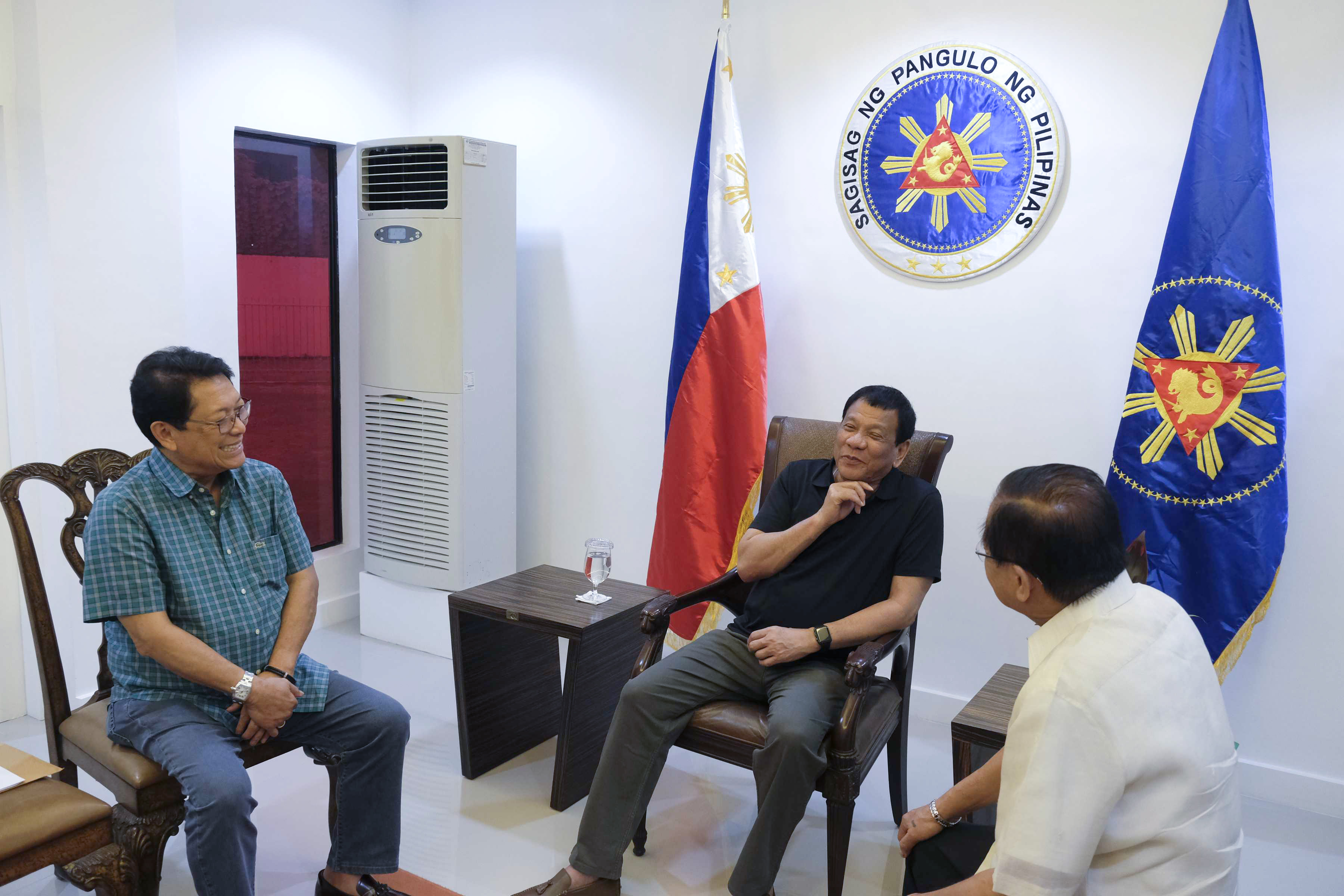The two panels are also expected to decide on the 'referee' in the bilateral ceasefire agreement, after Norway begged off from the role

PREPARING TO TALK. President Rodrigo Duterte discusses peace talks with the Left with chief government negotiator Labor chief Silvestre Bello III and Presidential Peace Process Adviser Jesus Dureza at the Presidential Guest House in Davao City on March 27, 2017. Photo by Rene Lumawag/Presidential Photo
As the government prepares to resume peace talks with communist rebels, President Rodrigo Duterte's only marching order to government negotiators is to seal a bilateral ceasefire agreement with the National Democratic Front (NDF) when they meet in the Netherlands in April.
"He had only one marching order: 'Get me a ceasefire agreement,'" said Labor Secretary Silvestre Bello III, the government's chief negotiator in talks with the NDF, at a Palace news briefing on Friday, March 31.
The government panel is aiming to reach a deal with the NDF on the bilateral ceasefire agreement by the end of the 4th round of peace talks to be held from April 2 to 6 in the Netherlands.
"We hope to arrive at a consensus on a bilateral ceasfire to end the hostilities on the ground," Bello said.
The government and NDF, the political wing of the Communist Party of the Philippines, have already exchanged their respective versions of the agreement ahead of the talks next week.
"It will be the first item on our agenda. And we have already an exchange of drafts as to the terms and conditions and parameters of the agreement," said Bello.
The definition of sensitive terms like the New People Army's (NPA) collection of revolutionary tax from businessmen as well as buffer zones will be discussed during the talks. These two issues will likely be the most difficult to resolve, the chief negotiator said.
New referee
Bello said another important matter that the two panels will discuss is the new referee in the implementation of the ceasefire agreement.
Bello said the government panel thought that the third party facilitator of the talks, Norway, would take on the role. Though Norway has reaffirmed its continued support as facilitator of the peace process, it begged off in acting as referee in the ceasefire deal.
"We were for a while under the impression that our third party facilitator, the Royal Norwegian Government would be willing to be the referee. But I think they are mindful of what happened in the FARC–Colombia peace process where they volunteered to be the referee," Bello said.
"Mukhang hindi naging maganda ang experience nila (It seems that they had a bad experience) so I think they are thinking of other countries [that] are also interested to be part of the ceasefire agreement. There were some countries already mentioned or are willing and in a...position to act as our referee," he added.
When asked, Bello said the countries that have expressed interest in becoming the referee in the ceasefire agreement are Switzerland, Canada, and Australia. "Maraming may gusto (Many are volunteering)," he said.
Duterte's list
The Palace released a list of the elements of a bilateral ceasefire agreement favored by Duterte. Among other things, the President wants a deal in which the NPA, the armed wing of the CPP, agrees to stop collecting revolutionary tax and to stop the destruction of property.
Socio-economic reforms, the "heart and soul of the peace process," will also comprise a major chunk of discussions in the Netherlands.
With these reforms and the bilateral ceasefire deal on the agenda, Bello knows this round of talks will not be a walk in the park.
"We expect this round to be very difficult and exacting but we shall be persistent in advancing the cause of peace," he said.
Responding to questions, Bello said the government panel is not unduly bothered by the NPA's supposed torching of government facilities. Bello said this is only "expected" in a state of armed conflict.
"Unless a unilateral ceasefire is declared, we should expect things like that to happen even while talks are happening," said the government negotiator.
Efforts of the NPA to step up recruiting and gathering arms is also not a cause of concern for the government. Bello said these moves are only a form of "posturing" and "propaganda" so that the CPP can negotiate with the government in a "position of strength."
As the government prepared for the next round of talks, Bello announced the government is not likely to declare a unilateral ceasefire even if the CPP announced it would declare its ceasefire by March 31.
No comments:
Post a Comment
Note: Only a member of this blog may post a comment.